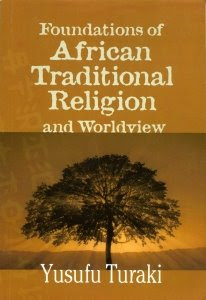
Yusufu Turaki, Foundations of African Traditional Religion and Worldview (Nairobi, Kenya: WordAlive Publishers, 2006), 128 pp.
There are many different ways that individuals can study African Traditional Religion (ATR): historical, psychological, sociological, etc. But one approach is often overlooked, the theological. When examined in this manner, many important questions are raised. What is the ATR worldview--its framework for understanding the world in which we live? What are ATR's basic beliefs? How does ATR compare to the Christian faith?
Yusufu Turaki seeks to answer these questions in his book Foundations of African Traditional Religion and Worldview. A Nigerian theologian and scholar, Turaki is certainly qualified to address these essential religious issues. He begins by defining religion and placing ATR within its religious context. Next he turns to explaining its fundamental theological, philosophical, and ethical beliefs. After laying this groundwork, the author continues to examine ATR's beliefs regarding the Supreme Being as well as the gods and spirits. Then he looks at how humans interact with the spirit world, from communication to the acquisition and use of power. Finally, he analyzes what it means to be human and the meaning of life according to ATR.
I learned a great deal from Turaki's book. To begin with, I appreciate his approach--laying out the fundamentals of ATR as a whole while showing how these foundational beliefs relate to each other. Understanding ATR as a worldview has been tremendously informative. I am amazed that he was able to include so much in such a few pages! This work will definitely be a convenient reference.
At the same time, I also find this book's brevity to be a limitation. When reading it, I regularly found myself wanting to dig deeper and learn more. At times, I almost felt as if I was reading through a beefed-up outline. While this may have been the author's intent, his book would be more useful with additional expansion and analysis.
Turaki also seems somewhat overly dependent on the work of Philip M. Steyne. He admits his dependence in the first chapter, but his citations and quotations from Steyne were so frequent that I occasionally wondered if I should simply read Steyne instead.
In any case, I'd still suggest that those interested in an introduction to ATR should read Turaki's book. It is a helpful starting point to further study. I hope that more theologians, philosophers, missionaries, and others will build off of the foundations of a work like this to further equip the body of Christ.
There are many different ways that individuals can study African Traditional Religion (ATR): historical, psychological, sociological, etc. But one approach is often overlooked, the theological. When examined in this manner, many important questions are raised. What is the ATR worldview--its framework for understanding the world in which we live? What are ATR's basic beliefs? How does ATR compare to the Christian faith?
Yusufu Turaki seeks to answer these questions in his book Foundations of African Traditional Religion and Worldview. A Nigerian theologian and scholar, Turaki is certainly qualified to address these essential religious issues. He begins by defining religion and placing ATR within its religious context. Next he turns to explaining its fundamental theological, philosophical, and ethical beliefs. After laying this groundwork, the author continues to examine ATR's beliefs regarding the Supreme Being as well as the gods and spirits. Then he looks at how humans interact with the spirit world, from communication to the acquisition and use of power. Finally, he analyzes what it means to be human and the meaning of life according to ATR.
I learned a great deal from Turaki's book. To begin with, I appreciate his approach--laying out the fundamentals of ATR as a whole while showing how these foundational beliefs relate to each other. Understanding ATR as a worldview has been tremendously informative. I am amazed that he was able to include so much in such a few pages! This work will definitely be a convenient reference.
At the same time, I also find this book's brevity to be a limitation. When reading it, I regularly found myself wanting to dig deeper and learn more. At times, I almost felt as if I was reading through a beefed-up outline. While this may have been the author's intent, his book would be more useful with additional expansion and analysis.
Turaki also seems somewhat overly dependent on the work of Philip M. Steyne. He admits his dependence in the first chapter, but his citations and quotations from Steyne were so frequent that I occasionally wondered if I should simply read Steyne instead.
In any case, I'd still suggest that those interested in an introduction to ATR should read Turaki's book. It is a helpful starting point to further study. I hope that more theologians, philosophers, missionaries, and others will build off of the foundations of a work like this to further equip the body of Christ.



